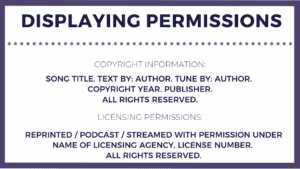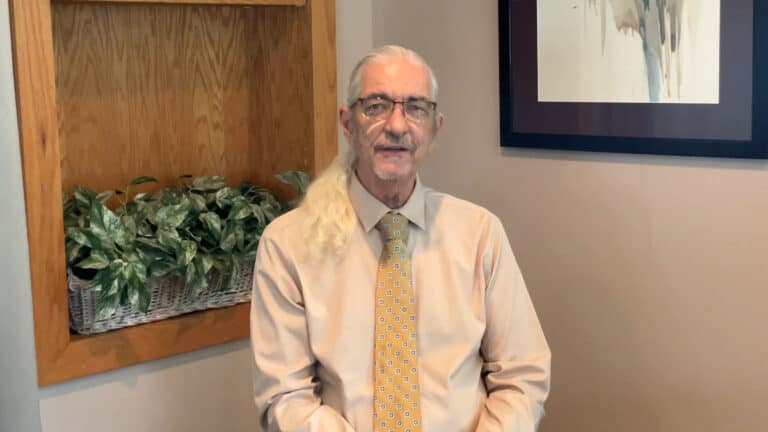Have you ever found yourself confused by copyright compliance in music ministry? Does thinking about the difference between a copyright holder and a publisher or wondering what it means if a title is copyrighted by one person but administered by a publishing house keep you up at night?
Hopefully, worrying about copyright isn’t causing you to lose sleep. As church musicians and people of faith, we want to do the right thing, yet it can be difficult to keep up with all the ins and outs of copyright compliance in music ministry. Here are some helpful tips for ensuring your organization is appropriately licensed for the copyrighted music you use in your worship services.
What is copyright?
Copyright is a form of intellectual property law. It protects any artistic medium: songs, poems, drama, literature, or even computer software. Whatever the medium, it must be in a fixed form; you cannot copyright an idea. Anytime you utilize a copyrighted work in a new way, for example, reprinting it in a worship aid, displaying it on a projection screen, or including it in an online worship service, the composer, author, or any other owners of that creative work deserve compensation for that use.
Licensing agencies like ONE LICENSE offer licensing options to help ensure that you are covered for your use of copyrighted titles, and that copyright holders are appropriately compensated for that use. If you are reprinting copyrighted texts and/or tunes for your congregation, streaming your worship services, or sharing rehearsal tracks with your musicians you likely need some form of copyright licensing.
Navigating the world of copyright compliance in music ministry can sometimes feel overwhelming, or even a bit scary! Many of us have heard stories of legal battles involving organizations that failed to remain copyright compliant, and none of us want to find ourselves in trouble for misusing copyrighted works. In addition to wanting to remain legally compliant, it’s also important to understand that holding appropriate copyright licensing is a justice issue. Ensuring that composers, authors, and other artists are appropriately compensated for the use of their creative work allows them to feed themselves and their families, to pay their mortgage, and hopefully, to be able to continue composing and contributing creative work for us to utilize within our worshiping communities.
Two key steps for copyright compliance in music ministry
If you are using copyrighted music in any of the ways described above, you need a license. It’s important to remember that ownership of a hymnal or songbook does not imply additional rights to reproduce or photocopy from that resource. Additionally, copyright is song specific, not hymnal or songbook specific. For example, just because a title is included in ABC Publishing’s hymnal does not mean that ABC Publishing holds the copyright for every title found in the hymnal or that those hymnal permissions include usage permissions for your worship services. Be sure to review the copyright elements for the individual title, rather than the hymnal or songbook itself. This information can typically be found at the top or bottom of the hymnal page, or in some hymnals, copyrights are indexed in the back of the book.
Step 1: Display your licensing permissions
One vital aspect of getting the most out of your licensing permissions, and remaining copyright compliant, is properly displaying those permissions. Whether you purchase your permissions from ONE LICENSE, another licensing agency, or the copyright holder themselves, you should display your permissions in your worship aid, on your projection screen, and/or in your online service(s), follow this basic format:

The copyright information (song title, text, tune, copyright, and publisher) should be displayed for each title used within your service. While you are certainly welcome to list your licensing information at the end of each title, the licensing permission information need only be shown once. We suggest placing this information at the beginning or end of your worship aid, projection slides, or worship video. Putting this information within the video itself and in the video description or in a comment on the video is ideal for online services.
Step 2: Report your music usage
In the case of ONE LICENSE, as well as most other licensing agencies, you will also need to consistently and accurately report your music usage. Note that use of public domain titles does not need to be licensed or reported.
You should report copyrighted music that you reprint for an in-person worship service as well as all copyrighted music that will be shared online on any platform. Reprinting refers to taking the text and/or melody lines out of the originally purchased resource and using them in a “new” way. Examples of this include putting the text and/or melody line into your worship aid or on a projection screen. Any copyrighted titles that can be heard in your online worship service(s) should also be reported.
If you have questions or concerns about copyright compliance in music ministry, please feel free to reach out to the ONE LICENSE Team at info@onelicense.net. We are always happy to help in any way we can!
Katie M. Deaver, Ph. D. serves as the General Manager of ONE LICENSE. She has served in a variety of music ministry settings and is currently a lay member and seasonal musician at Prince of Peace Lutheran Church in Harvey, Michigan.
Copyright © 2025 Catholic Liturgical Ensemble Formation
Looking for more resources? Search our full online library of CLEF Life resources, or sign up for CLEF Life email updates to receive the latest resource in your inbox once a week.



